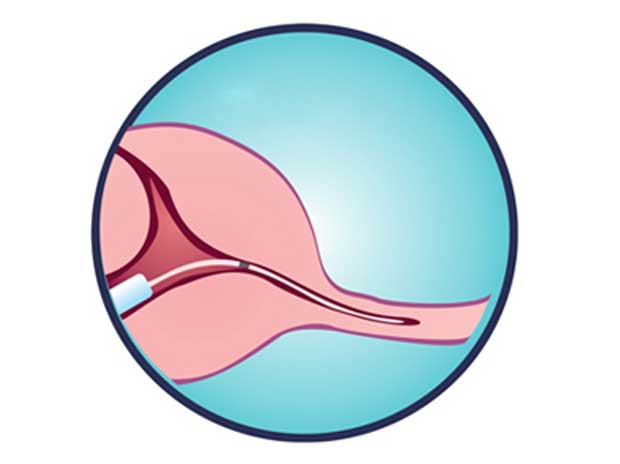What is fallopian tube cannulation (by keyhole surgery)?
If a woman is suffering from subfertility issues with a blockage in the part of the fallopian tubes closest to the womb, they can have treatment of Fallopian tube cannulation.
Why is fallopian tube cannulation performed?
About 1 in 6 couples, subfertility problem is seen. There may be many reasons but in 20% of couples, subfertility is because of blockage of fallopian tubes either completely or partially. Normal fallopian tube function is important in allowing the egg (oocyte) to meet the sperm for fertilization (joining of the egg and sperm) and to allow the fertilized egg (embryo) to travel to the womb (uterus). The blockage of fallopian tubes is mostly due to previous infections, adhesions, and endometriosis. These can be diagnosed by hysterosalpingogram (X-Ray Test) or by going laparoscopy. In a specific group of women, the blockage is in the first and closest part to the uterus (proximal part) and this may be treated by fallopian tube cannulation.
Am I suitable for fallopian tube cannulation?
Fallopian tube cannulation procedure is suitable for:
- 1. Having subfertility due to tubal factor.
- 2. When a tubal blockage is diagnosed by a hysterosalpingogram or dye test.
- 3. If the blockage is at the proximal part of the fallopian tube.
What are the alternatives to fallopian tube cannulation?
Your doctor will be able to advise you regarding the alternatives to increase your chances of achieving a pregnancy-specific to your circumstances. However, in general for couples with subfertility due to the tube factor, the main alternative involves undergoing IVF (in vitro fertilization).
How is fallopian tube cannulation performed?
This procedure is performed by keyhole surgery with cameras of hysteroscopy and laparoscopy. Hysteroscopy and laparoscopy are surgical procedures that allow the surgeon to access the inside of the womb and the abdomen respectively using a narrow tube that contains a camera and a light source. While visualizing the abdomen and the pelvis through the laparoscope, a fine guidewire is introduced into the womb and the opening of the fallopian tube. It is carefully used to unblock the tube. A dye is then introduced through the womb into the fallopian tubes to check whether it can pass through into the pelvis and determine whether the procedure has been successful. This is similar to the way an artery is unblocked in the heart to treat heart disease.
How successful is fallopian tube cannulation?
The published evidence suggests that fallopian tube cannulation achieves tubal patency (successfully treating the blockage) in approximately 70% of women and is successful in achieving a pregnancy in 10-20% of women afterward. (NICE interventional procedures Programme 2013).
How safe is fallopian tube cannulation?
Generally, this is a safe procedure. Serious complications as a result of surgery are rare and occur in an estimated 1 in 1000 cases. These complications are related to the laparoscopy and not the procedure of tubal cannulation itself. Possible complications from a laparoscopy and hysteroscopy include injury to organs, such as bladder and bowel, and injury to a major artery (blood vessel). Possible complications of the fallopian tube cannulation procedure include perforation of the fallopian tube (injury of the fallopian tube resulting from the guidewire insertion) in 110% of cases, infection and ectopic pregnancy. Ectopic pregnancies are those which implant outside the womb, most commonly in the fallopian tube and can be dangerous if undiagnosed. However, any woman with complete or partial blockage of her tubes is at a higher risk of developing an ectopic pregnancy. If you successfully conceive after this procedure an ultrasound scan must be arranged at approximately 6-7 weeks’ gestation to ensure that your pregnancy is developing normally.
How long will I need to be in the hospital?
Most women will be able to return home on the day of the operation (‘day-case surgery’), although different people recover from a general anesthetic and the operation differently and so you may need to stay in hospital a little longer.
Will I have pain or vaginal bleeding after my operation?
Women who undergo laparoscopy commonly describe lower abdominal, upper leg, and shoulder tip pain. You will also have 2-4 incision sites where the laparoscopy and instruments were inserted over your abdomen. After the operation and for 10 – 14 days the pain may be seen. The team will provide the appropriate pain relief accordingly. Use only sanitary towels whereas tampons increase the risk of developing the infection. If you feel your bleeding is prolonged or becomes foul-smelling, please seek advice IVF specialists.
When can I have sex again?
Yes, you can have but not when vaginal bleeding stopped. We would recommend trying for pregnancy when you are comfortable sooner rather than later. Please ensure you have had appropriate investigations regarding ovulation and semen analysis.
When can I expect to resume normal activities?
You can resume your normal activities whenever you feel well, like not getting tired. Avoid heavy lifting, housework for 10-14 days.
Can I help towards understanding tubal blockage and its treatment?
Yes – We are very interested in the outcomes of women who undergo fallopian tube cannulation and whether they have any success in achieving a pregnancy in the future. Many women are referred from outside our local area and we often do not find out their outcomes. As we are keen to regularly evaluate our services and assess your outcome, we would be grateful if you would agree to be contacted in the future. We would also be grateful if you would contact us with the details below if you successfully become pregnant in the future.

